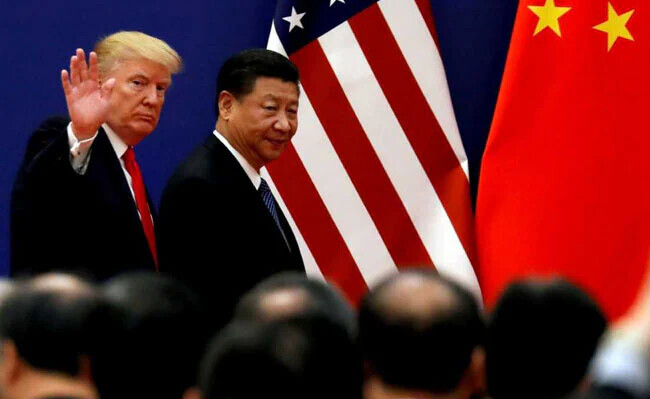China has retaliated against the US by imposing tariffs on American goods, including coal, gas, and agricultural equipment, in response to President Trump’s 10% tariff on Chinese products. China will also investigate Google for alleged antitrust violations and has added several US companies, including Calvin Klein’s owner and Illumina Inc., to a blacklist. The move escalates the trade war between the two nations, with China imposing tariffs of 15% on coal and gas and 10% on oil and agricultural equipment.
China has hit back at the US over the tariffs imposed by President Trump, stating that the move violates World Trade Organization rules and hampers economic cooperation between the two nations. Beijing has imposed tariffs on US goods, targeting critical minerals that could disrupt the US supply chain, while also affecting major US companies operating in China. Chinese President Xi Jinping’s response is seen as a calculated move to inflict damage on the US economy while minimizing the impact on China’s own economy.
Market reactions were relatively subdued following news of China’s tariffs, partly due to speculation that President Xi might take further steps to support the Chinese economy. Additionally, President Trump expressed a willingness to talk with Xi before the tariffs went into effect. The US dollar strengthened, while the offshore yuan fell by 0.3%. Currencies of Australia and New Zealand, which have close trade ties with China, dropped nearly 1%, and other Asian currencies, such as the Thai baht and Indonesian rupiah, retraced some of their earlier gains.
China’s response to the US tariffs has been described as “measured and appropriate” by Professor Dylan Loh of Nanyang Technological University in Singapore. China’s retaliation, which came soon after the US tariffs took effect, was seen as a way to appear proactive without inviting further retaliation. This approach is likely influenced by the US’s recent reprieve for Canada and Mexico from tariffs, which suggests that a deal may still be possible.
According to ship-tracking data, the US provided around 6% of China’s LNG imports last year, while coal imports from the US are minimal. Since 2010, Google’s consumer search and internet services have been blocked in China, although the company continues operations mainly in advertising.
Lynn Song, chief economist for Greater China at ING Bank, described China’s response as a “muted retaliation,” signaling a warning to US companies reliant on the Chinese market. Despite the tensions, Song remains optimistic that tariffs might be reduced or postponed following direct negotiations. Additionally, China is the world’s leading producer of tungsten, contributing about 80% of global production. Tungsten is crucial in the defense sector due to its density and high melting point, commonly used in armor-piercing missiles.
PVH, the parent company of Tommy Hilfiger, has been under Chinese regulatory scrutiny since September for allegedly boycotting cotton from Xinjiang, although this issue was not addressed in a recent statement. Illumina, a leading provider of genetic sequencing, competes with China’s BGI Genomics Co.
Recently, former President Trump ordered a broad tariff on Chinese exports, set to take effect after midnight on Tuesday, citing China’s failure to curb illegal drug trafficking. The order includes clauses that would increase tariffs if China retaliates.
A strong response from China could escalate tensions between the US and China, which had stabilized following a meeting between Xi and then-President Biden in November 2023. Despite ongoing issues related to technology access and territorial disputes, both nations have resumed high-level dialogues. Prior to Trump’s inauguration, he and Xi discussed various topics, including trade, TikTok, and fentanyl.
Trump announced on Monday that he and Xi would likely speak again “probably over the next 24 hours,” but Beijing has not yet publicly commented on this statement.
